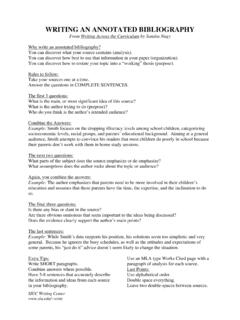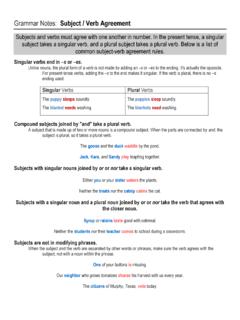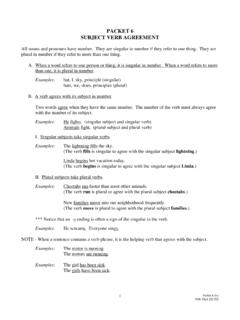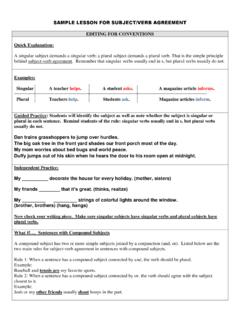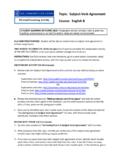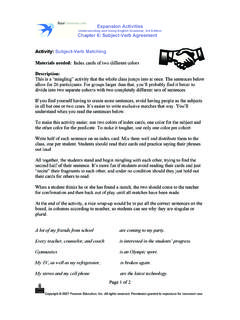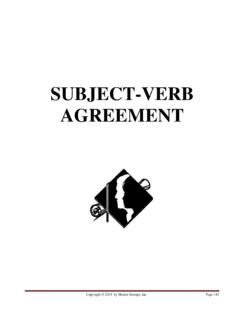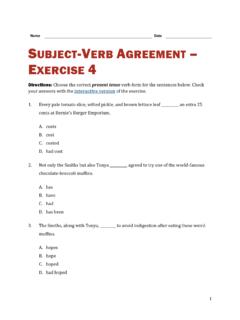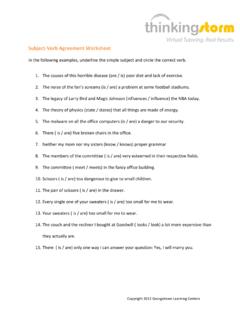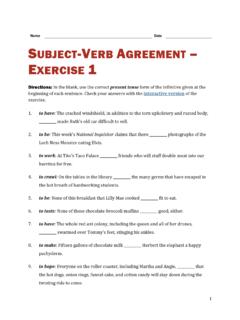Transcription of SUBJECT VERB AGREEMENT II - The Writing Center
1 Compiled and edited by SIUC Writing Center - Based on SUBJECT - verb AGREEMENT Basic Principle: Singular subjects need singular verbs; plural subjects need plural verbs. Example: My sister is a teacher. My brothers are engineers. 1. The indefinite pronouns anyone, everyone, someone, no one, nobody are always singular and, therefore, require singular verbs. Example: Everyone is ready. Somebody has left her purse. Some indefinite pronouns such as all, some are singular or plural depending on what they're referring to.
2 (Is the thing referred to countable or not?) Be careful choosing a verb to accompany such pronouns. Example: Some of the books are missing. Some of the oil is gone. There is one indefinite pronoun, none, which can be either singular or plural; it often doesn't matter whether you use a singular or a plural verb unless something else in the sentence determines its number. (Writers generally think of none as meaning not any and will choose a plural verb , as in "None of the students are studying," but when something else makes us regard none as meaning not one, we want a singular verb , as in "None of the food is cooked.)
3 ") Example: None of you eats meat. None of you eat meat. None of the students have done their homework. (In this last example, the word their precludes the use of the singular verb . Some indefinite pronouns are particularly troublesome. everyone , everybody and everything (listed above, also) certainly feel like more than one person; therefore, you are sometimes tempted to use a plural verb with them. They are always singular, though. Each is often followed by a prepositional phrase ending in a plural word ( Each of the students ), which confuses the verb choice.
4 Each, too, is always singular and requires a singular verb . Example: Everyone has gone. You would always say, "Everybody is here." This means that the word is singular and nothing will change that. Example: Each of the students is responsible for keeping this room clean. Don't let the word "students" confuse you; the SUBJECT is each and each is always singular Each is responsible. Compiled and edited by SIUC Writing Center - Based on 2. Phrases such as together with , as well as , and along with are not the same as and.
5 The phrase introduced by as well as or along with will modify the earlier word (mayor in this case), but it does not compound the subjects (as the word and would do). Example: The mayor as well as his brothers is going to prison. The mayor and his brothers are going to jail. 3. The pronouns neither and either are singular and require singular verbs even though they seem to be referring, in a sense, to two things. Example: Neither of the two traffic lights is working. Which shirt do you want for Christmas? Either is fine with me.
6 In informal Writing , neither and either sometimes take a plural verb when these pronouns are followed by a prepositional phrase beginning with of. This is particularly true of interrogative constructions: "Have either of you two clowns read the assignment?" "Are either of you taking this seriously?" 4. The conjunction or does not conjoin (as and does): when nor or or is used the SUBJECT closer to the verb determines the number of the verb . Whether the SUBJECT comes before or after the verb doesn't matter; the proximity determines the number.
7 Example: Either my father or my brothers are going to sell the house. Neither my brothers nor my father is going to sell the house. Are either my brothers or my father responsible? Is either my father or my brothers responsible? Because a sentence like "Neither my brothers nor my father is going to sell the house" sounds peculiar, it is probably a good idea to put the plural SUBJECT closer to the verb whenever that is possible. 5. The words there and here are never subjects. Example: There are two reasons [plural SUBJECT ] for this.
8 There is no reason for this. Here are two apples. With these constructions (called expletive constructions), the SUBJECT follows the verb but still determines the number of the verb . Compiled and edited by SIUC Writing Center - Based on 6. Sometimes modifiers will get between a SUBJECT and its verb , but these modifiers must not confuse the AGREEMENT between the SUBJECT and its verb . Example: The mayor, who has been convicted along with his four brothers on four counts of various crimes but who also seems, like a cat, to have several political lives, is finally going to jail.
9 7. Sometimes nouns take weird forms and can fool us into thinking they're plural when they're really singular and vice-versa. Words such as glasses, pants, pliers, and scissors are regarded as plural (and require plural verbs) unless they're preceded the phrase pair of (in which case the word pair becomes the SUBJECT ). Example: My glasses were on the bed. My pants were torn. A pair of plaid trousers is in the oven. 8. Some words end in -s and appear to be plural but are really singular and require singular verbs.
10 Example: The news from the front is bad. Measles is a dangerous disease for pregnant women. On the other hand, some words ending in -s refer to a single thing but are nonetheless plural and require a plural verb . Example: My assets were wiped out in the depression. The average worker's earnings have gone up dramatically. Our thanks go to the workers who supported the union. The names of sports teams that do not end in "s" will take a plural verb : Example: The Miami Heat have been looking .. , The Connecticut Sun are hoping that new talent.





